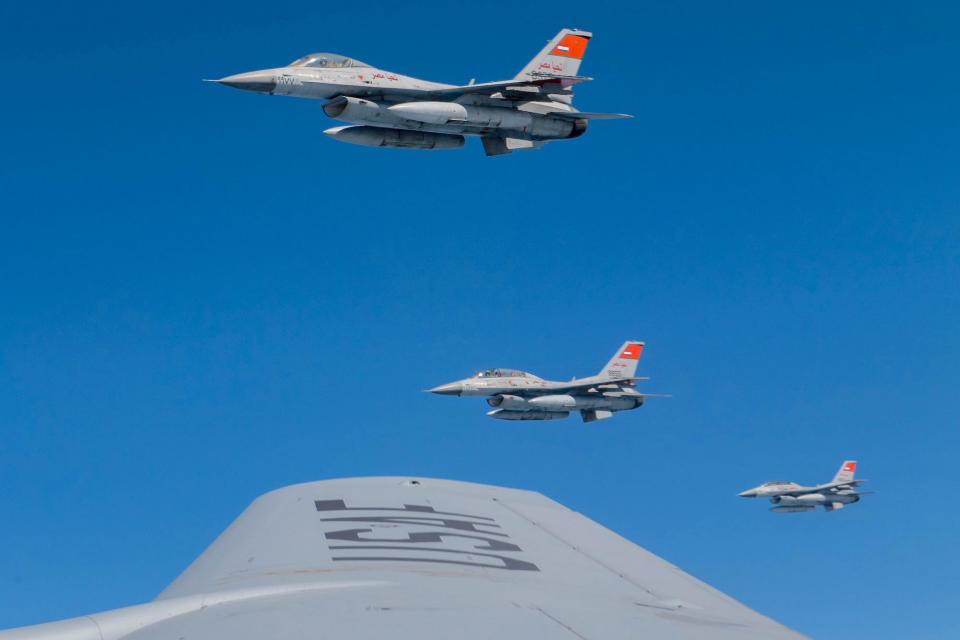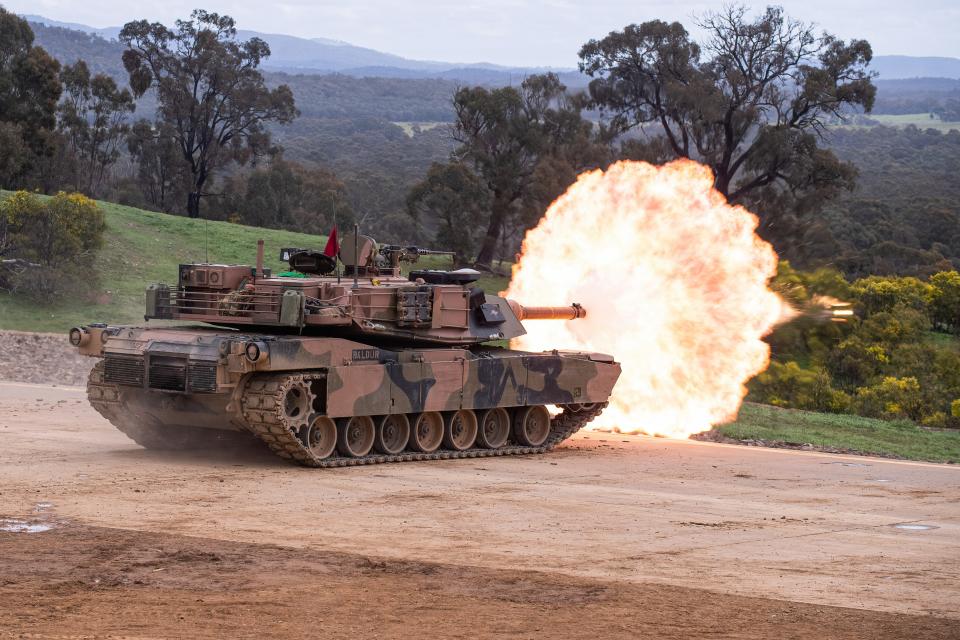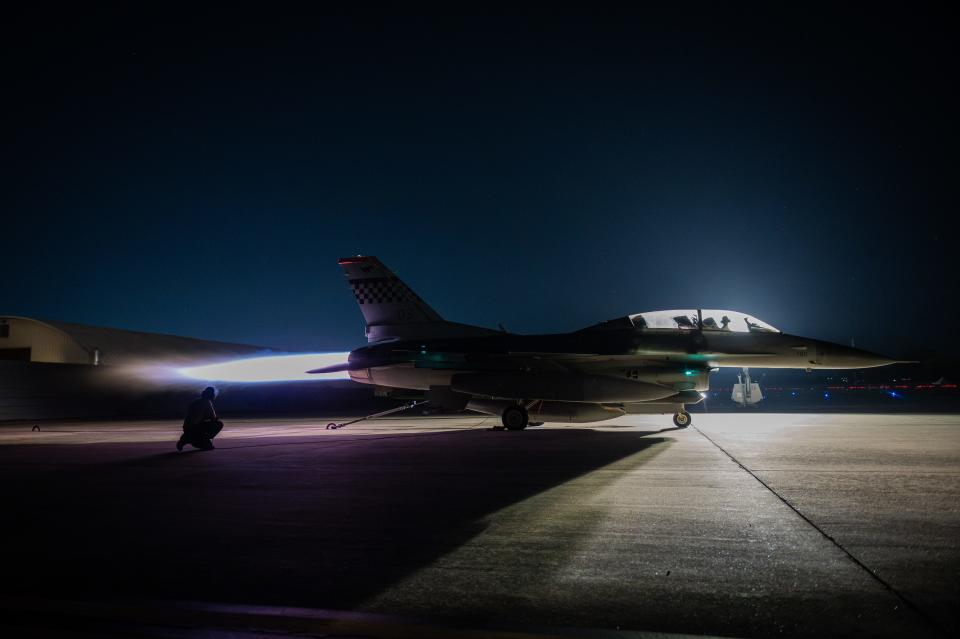Zelenskyy says the problem with the coming F-16 fighter jets is the same one Ukraine had with the Abrams tanks
Ukraine is set to receive its first F-16 fighter jets from its Western partners this summer.
But the exact number of planes is unclear, and Volodymyr Zelenskyy said it probably wouldn't be enough.
He compared the problem to Ukraine's Abrams tanks, which it only got 31 of and hasn't used much.
Western-provided F-16 fighter jets are on their way to Ukraine and set to start flying missions later this summer.
But they might not yet be enough to make a difference on the battlefield, Ukrainian President Volodymyr Zelenskyy indicated in a discussion this week on what Ukraine needs, comparing the jets to the US-made Abrams tanks that Ukraine got last fall.
When the Fox News host Bret Baier asked him at the Reagan Institute whether the 31 Abrams Ukraine received as its counteroffensive was already stumbling made a difference, Zelenskyy said, "I'm not sure that such number of tanks can change the situation on the battlefield."
Speaking in Washington, DC, on Wednesday as the NATO summit was underway, he said, "It's like the dialogue about F-16," adding that usefulness came down, in some ways, to numbers and timing.
"We always wait, like my mother waited me after school," Zelenskyy said. "This is the same but much more serious."
"The problem with F-16," the Ukrainian president said, "is the number and the dates."
The Ukrainian President said that because Russia was operating so many combat aircraft "on the territory of Ukraine," small numbers of F-16s wouldn't make a difference.
"Even if we will have 50, it's nothing. They have 300. Because we are defending, we need 128," he said, adding that unless Ukraine had that amount of F-16s, they wouldn't "compare with them in the sky." He said that "it will be difficult."

As Zelenskyy noted, his concerns about the number of F-16s coming and the timing of those deliveries mirror conversations surrounding the US-provided Abrams tanks, which arrived in Ukraine last fall. The US sent only 31 M1A1 Abrams in total, and they were delivered to Ukraine months after British and German tanks.
The Abrams is recognized as a "tank killer" and celebrated for its lethality and heavy armor. It has a fearsome reputation, particularly given its exploits in the Gulf War in the early 1990s. Defense experts and former tank operators have praised the Abrams' capabilities, noting that it's far superior to any Russian tank.
But the Abrams hasn't been able to fight the battles it was made for in Ukraine, where massed armored assaults haven't been an option and tank-on-tank combat is uncommon. It also faces threats from drones, anti-tank weapons, and mines, and it's a high-profile target available in only limited numbers.
For comparison, Ukraine received about 300 US-made Bradley infantry fighting vehicles, nearly 10 times the number of Abrams sent.

Zelenskyy's comments followed the announcement from the US secretary of state, Antony Blinken, earlier Wednesday that the first transfer of F-16 fighters to Ukraine — coming from Denmark and the Netherlands — was underway.
"Those jets will be flying in the skies of Ukraine this summer to make sure that Ukraine can continue to effectively defend itself against Russian aggression," he said at the NATO public forum.
The arrival of the fourth-generation aircraft will be important for Ukraine as an upgrade over Kyiv's Soviet-era air power and another marker of closer relations with the West. But there have been questions surrounding how useful the fighters will be on the battlefield and whether there will be enough jets and trained pilots to make a difference. There have also been concerns they may be coming significantly later than when Ukraine needed them most.
The West has attributed the long road to getting F-16s to Ukraine to complicated logistics.
"The trouble is that for F-16s, it's not as simple as just getting the planes and handing them over. The planes have to be reconfigured from the different air forces that they come from to make them suitable and usable for the Ukrainian air force," a NATO official said to reporters at a briefing on the sidelines of the summit Thursday.

The official also noted the training, logistics, and capabilities that are required to operate and defend airfields and said the yearlong process of procuring and delivering the fighters was "actually pretty good."
"If you look at a program like this, generally, even [when an] allied country in peacetime conditions takes on a new airframe like this, it could take much, much longer to get everything into place," the official said.
In a call with the press on Thursday, the White House national security advisor, Jake Sullivan, acknowledged that the "ramp-up period" to get F-16s operational in Ukraine had been significant but added that the jets were expected to have an impact in the short-term and give Ukraine the capability to take back territory currently occupied by Russia.
Read the original article on Business Insider

 Yahoo News
Yahoo News 
